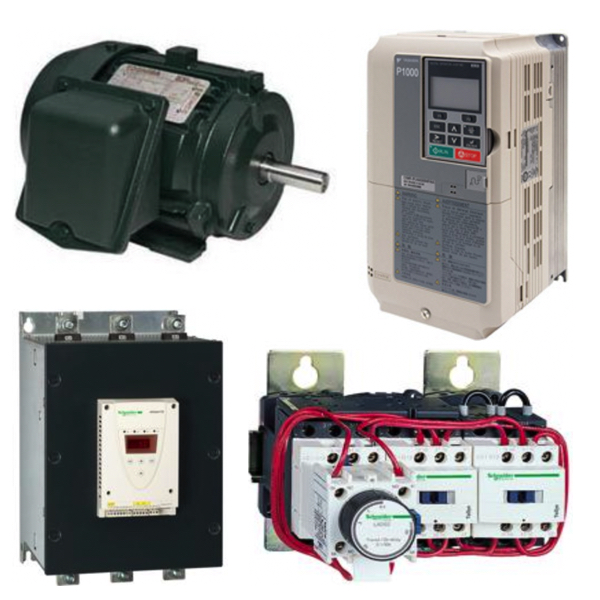Motors & Motor Control

At RSP Supply, we provide a full range of motors and motor control solutions engineered for performance, reliability, and efficiency in industrial automation, HVAC, and manufacturing. Our catalog includes AC motors, DC motors, soft starters, motor starters, and variable frequency drives (VFDs) - all designed to optimize equipment operation and extend service life.
AC induction motors are known for their rugged design and low maintenance, making them ideal for heavy-duty applications like conveyors, pumps, and compressors. For precision control and fast acceleration, DC motors and brushless motor systems deliver high responsiveness and efficient energy use. Combined with intelligent motor control components - including inverters, relays, and contactors - these systems enable accurate torque control, speed regulation, and overload protection.
Whether your goal is energy efficiency, automation flexibility, or smoother startups, motor control technology such as soft starters and VFDs helps reduce mechanical wear and inrush current, improving both system performance and longevity.
From standard industrial drives to advanced motion control systems, RSP Supply offers trusted products from top manufacturers that keep your operations running reliably and efficiently.
FAQs – Motors and Motor Control
Q: What’s the difference between AC and DC motors?
AC motors are durable and efficient for continuous operation, while DC motors offer precise speed and torque control for applications that require quick acceleration or deceleration.
Q: Why use a soft starter or VFD with a motor?
Soft starters and VFDs reduce inrush current, minimize mechanical stress, and provide smoother startup and shutdown, extending motor life and improving efficiency.
Q: Which motor control solution is best for energy efficiency?
Variable Frequency Drives (VFDs) offer the highest energy savings by adjusting motor speed to match system load, reducing overall power consumption.
Q: What types of industries use motor control systems?
Motor control solutions are used across manufacturing, automation, HVAC, water treatment, and renewable energy - wherever controlled motion and power efficiency are required.
Q: What brands of motors and motor controls does RSP Supply carry?
RSP Supply partners with leading manufacturers like Baldor-Reliance, Toshiba, Eaton, Schneider Electric, Yaskawa, Benshaw, ABB, Danfoss, and NAE, providing reliable solutions for every industrial need.
Why Buy Motors and Motor Control Solutions from RSP Supply
When you buy from RSP Supply, you gain access to a complete lineup of industrial motor and control solutions backed by expert support and fast, reliable service. Our products are sourced from trusted global brands known for performance and long-term reliability.
We understand the importance of uptime in critical operations - which is why we offer same-day shipping, competitive pricing, and dedicated technical assistance. Whether you need an AC motor for heavy machinery, a DC drive for automation, or a VFD for energy savings, RSP Supply is your one-stop source for efficient, reliable motor control solutions that keep your systems moving.

